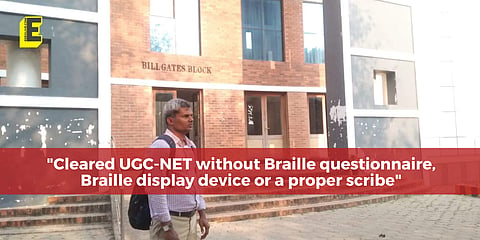

Amidst the ongoing debate surrounding the accessibility of candidates with disabilities, a truly exceptional and inspiring story emerges: Professor Miranda Donbosco Tomkinson, a deafblind candidate, has achieved a remarkable feat by clearing the National Eligibility Test of the University Grants Commission (UGC-NET) in Special Education after a challenging journey. The news of his accomplishment comes as a beacon of hope in the fight for equal opportunities.
"The results came out on July 25, we checked and I saw that I cleared my exam, and this time, without Braille questionnaire and Braille display device," reveals Dr Tomkinson.
In a remarkable display of determination, Prof Tomkinson managed to pass the UGC-NET this year with 38%, despite not having a Braille questionnaire, a Braille display device, or a proper scribe. This is not his first triumph; he had already cleared the exam twice before in 2013 and 2014, achieving over 50% in Sociology. However, he laments, “My scores could have been even higher if he had access to the required accommodations.”
In contrast to Sociology, Prof Tomkinson sees the NET qualification in Special Education as a gateway to more opportunities. This new path holds promise for him, opening doors that Sociology did not guarantee.
Hurdles all along the way
However, his journey has not been without its challenges. Having two postgraduate degrees, he faced significant hurdles in obtaining a Braille questionnaire back in 2014. Last year, during the UGC-NET December 2022 session, despite an order from Madras High Court (HC) and numerous requests, he was denied basic accommodation, the Braille questionnaire, thereby, preventing him from attempting the examination.
This time around, Prof Tomkinson was again denied a Braille questionnaire or a proper scribe. “As a deafblind, it is imperative that I need a Braille questionnaire. Deafblindness is not just the sum of two parts, it is a unique disability in itself that requires specific accommodations,” he asserts.
Professor Tomkinson, who brought along his diploma student to assist with communication, had to eventually rely on the student to act as his scribe during the exam. "I initially took my diploma student to help me communicate with the people at the centre, but later on, he had to act as my scribe because they couldn't provide an appropriate one for me. Unlike visually-challenged people, I cannot make use of a simple scribe," he explains.
Nevertheless, despite the hardships, Prof Tomkinson has proven that people with disabilities can achieve greatness when provided with the right adaptations, lifestyle and opportunities. His success stands as a powerful testament to the importance of accessibility and inclusivity.
Looking ahead, Prof Tomkinson aspires to work for a university and pursue his PhD, with this achievement being just one step towards his numerous other remarkable successes waiting for him.
Persistent discrimination
Unfortunately, Prof Tomkinson's story is also a stark reminder of the persisting discrimination faced by people with disabilities in a country where education is often considered the great equaliser. Disability rights activists have long highlighted the challenges that these individuals encounter while pursuing their dreams. His story serves as a call to action, urging society to work towards a more inclusive and accessible future for all.
As Tomkinson himself eloquently states, "Disabled people need their adapted lifestyle and opportunities, and if that is taken care of, it will lead them to achieve their goals as successful individuals."
